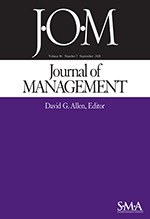
Bogaert, S., Boone, C., Negro, G. and \van Witteloostuijn\, A. (2016). Organizational Form Emergence: A Meta-Analysis of the Ecological Theory of Legitimation Journal of Management, 42(5):1344--1373.
-
Affiliated author
-
Publication year2016
-
JournalJournal of Management
In this study, the authors provide an assessment of the ecological theory of organizational form emergence and focus on the positive density effect associated with legitimation. The argument comes in two steps. First, organizational ecology seeks to understand cross-population similarities in search of general patterns in form emergence processes. Using summative meta-analysis, the authors show that the average effect of density dependence on population-level legitimation is positive, but this average effect hides large variation across different populations. Second, in the spirit of recent revisions of this theory, the authors introduce two concepts that can be linked to industries or populations to explain this unaccounted-for variation: perceived simplicity of organizational goals and tangibility of offerings. Using formative meta-analysis, the study reveals that both population-level characteristics increase legitimation. Density effects on organizational founding rates tend to be stronger in manufacturing and for-profit industries, which are arguably settings featuring higher simplicity of goals and larger tangibility of offerings, respectively. On the basis of this set of findings, the authors conclude with a plea for a population-level theory of ecological differences, developing a comparative research strategy that is distinct from the current emphasis on single-population studies.